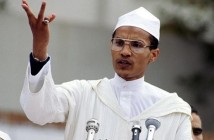
Mohammed VI called for speedy elections last month (AFP/File, Abdelhak Senna)
RABAT — Morocco announced plans Sunday to hold early parliamentary elections in mid-November, as the Arab world’s longest-serving monarchy pursues reforms in response to protests inspired by the Arab Spring.
During long overnight negotiations with the interior ministry, officials from some 20 political parties in the north African nation agreed in principle for the election to be held in mid-November.
Voters overwhelmingly approved a package of reforms limiting the powers of King Mohammed VI in a July 1 referendum.
“The parties and the interior ministry have agreed for the election to be held in mid-November,” Prime Minister Abbas al Fassi, secretary general of the nationalist Istiqlal party, told AFP.
He did not provide an exact date but other party officials said the vote would be held on or around November 11.
“The date of November 11 was agreed but the election could be shifted by a few days because of its proximity to the Eid al-Adha religious holiday,” Lahcen Daoudi, the deputy secretary general of the Islamist Justice and Development Party, told AFP.
Officials in two left-wing parties, the Party of Progress and Socialism (PPS) and the Labour Party, confirmed the date had been set for November 11.
“A decree establishing the date of the election will be published shortly by the government,” PPS Secretary General Nabil Benabdellah said.
An interior ministry official however said the November 11 decision was “not yet” official.
The mid-November date was seen as a compromise between political parties that had pushed for an October vote and those that wanted more time to prepare.
Mohammed VI called for speedy elections in a speech late last month. The king offered the reforms last spring following weeks of protests modelled on the demonstrations that ousted long-serving leaders in Tunisia and Egypt and have shaken much of the region.
Under the new constitution, the king will remain head of state, the military, and the Islamic faith in Morocco.
The prime minister, chosen from the largest party elected to parliament, will take over as the head of government.
Other changes would grant more power to parliament, introduce an independent judiciary and provide new guarantees of civil liberties.
More than 98 percent of voters endorsed the reforms in the referendum and Western leaders have praised the king for his moderate response to protests.
But critics have denounced the reforms as window-dressing and called for further limits on the powers of the king and his entourage.
They have also accused authorities of doing little to tackle corruption and have complained of a lack of economic opportunities, especially for youth.
The main group behind the protests, the February 20 Movement, has continued to hold regular demonstrations to call for further reforms.
Authorities in Morocco have been more tolerant of demonstrations than in some other Arab states and have largely allowed protests to go ahead without interference.
Analysts say it is likely the authorities will continue to tolerate the protests, which have been peaceful and have not called for the overthrow of the king, who is widely revered.
http://www.google.com/hostednews/afp/article/ALeqM5gG0sX-Iy8QBDswYejTmFf21EjcUA?docId=CNG.bbda37119a87293406a147740bcf3591.ae1






